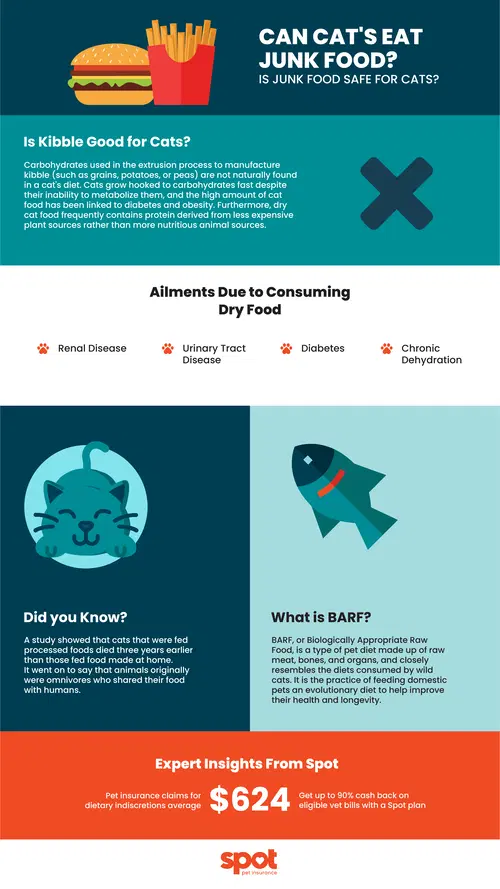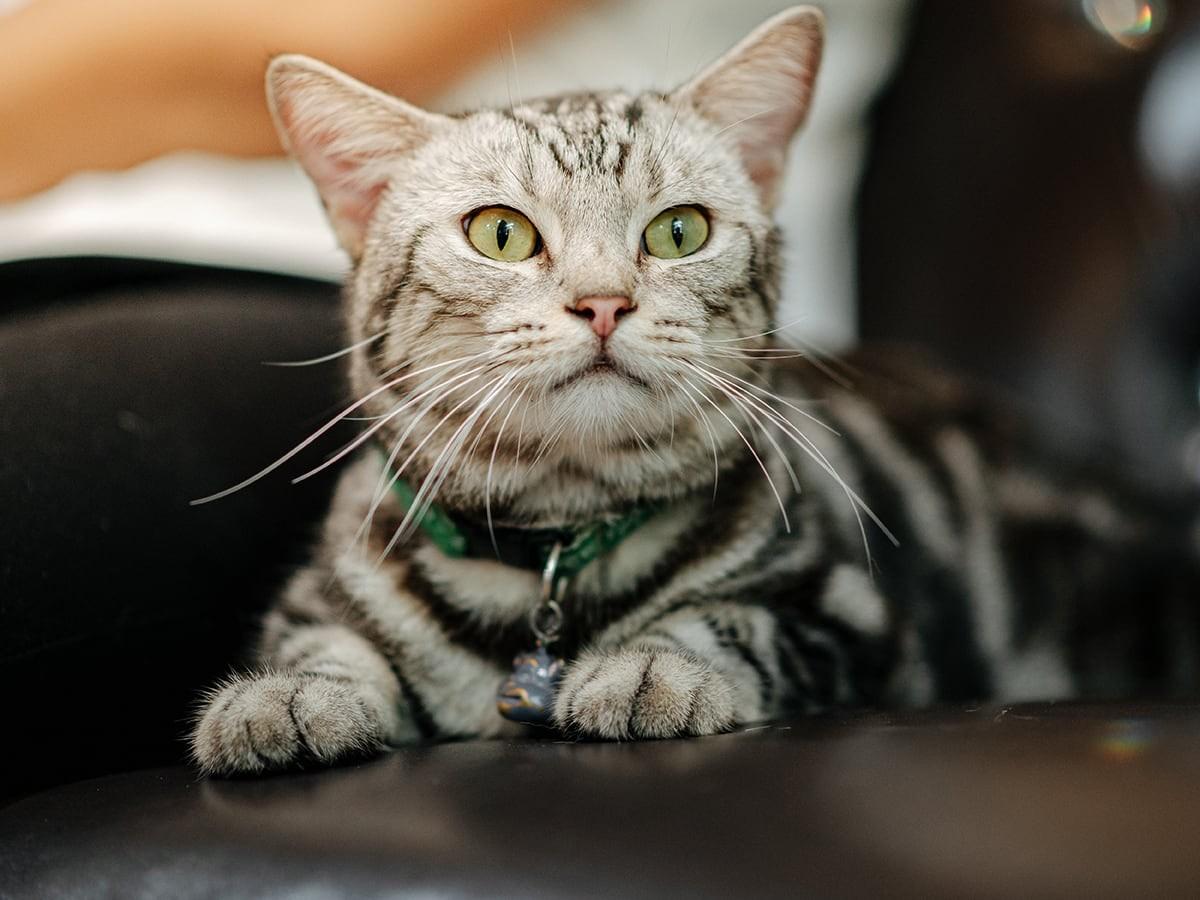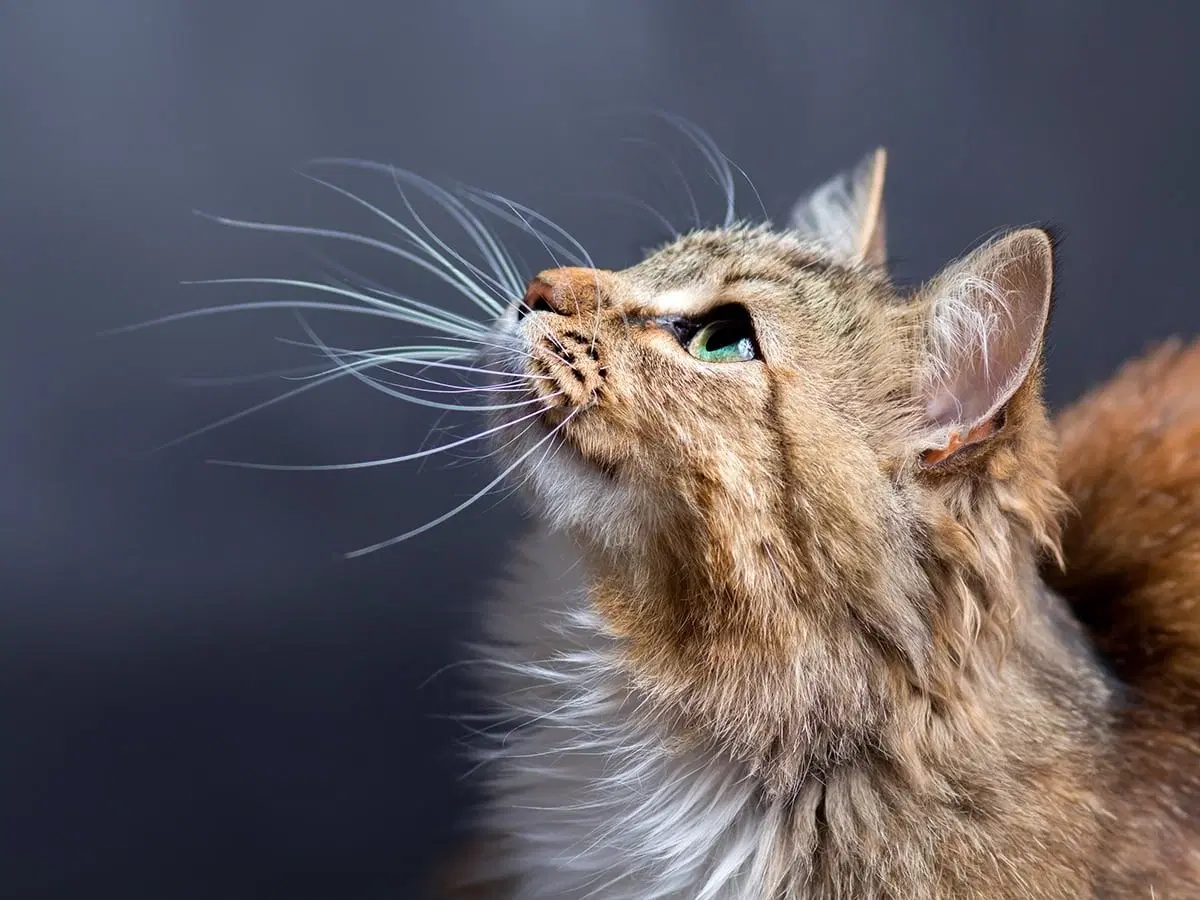Have you ever caught your cat attempting to grab a slice of pizza or a french fry? Cats are junk food junkies, and when given the choice between nutritious food and junk food, they frequently choose the latter! Cats have a strong need for fat and salt and can quickly become addicted to both.
While many cats are picky eaters, some can develop unusual preferences, which are especially obvious in multi-cat families. Ice cream, cheese, toast, bacon rinds, and yes, even chips/crisps are examples of foods that are not beneficial to your cat, that they still might try to swipe when you aren't looking. Sugary and fatty diets can lead to obesity and, in the long run, diabetes. Dairy, while acceptable in tiny amounts by some cats, can induce bloating and diarrhea, and processed meals, which are frequently high in salt content, can cause renal difficulties.

Is Kibble Good for Cats?
While dry food is convenient, it is so different from a cat's normal diet that a range of ailments, including renal disease, urinary tract disease, and diabetes, have become frequent in cats.1
To understand why kibble is so terrible for cats, first learn about their ancestors' lifestyle. The domestic cat evolved in the Middle Eastern deserts. They obtained the water they required from their diet of rodents and birds. Because cats are less sensitive to thirst and dehydration than dogs, they are unlikely to drink enough water to keep their kidneys and urinary systems washed out if fed dry kibble. Chronic dehydration can result in inflammation and illness.
The issue with kibble is that it is virtually completely composed of carbs. Cheaper pet rolls aren't any better because they're sometimes bulked out with iffy grain or veggies. The same is true with canned pet food, which, as David explains, is also bulked out with additives. When it comes to individuals, it surely pays to read the labels.
Carbohydrates used in the extrusion process to manufacture kibble (such as grains, potatoes, or peas) are not naturally found in a cat's diet. Cats grow hooked to carbohydrates fast despite their inability to metabolize them, and the high amount of cat food has been linked to diabetes and obesity. Furthermore, dry cat food frequently contains protein derived from less expensive plant sources rather than more nutritious animal sources.1
In the wild, cats would receive their carbs from the contents of the stomachs of the animals they ate, such as mice and birds, when little but the feat, feathers, nose, and beak remained. This is most likely where the 5 - 10% carbohydrate claim originates from. Tiny quantities of carbohydrates may come from the grass that many cats consume spontaneously to aid digestion and hock up hairballs.
What Do the Experts Think About Cats Eating Junk Food?
According to veterinary surgeons and specialists, the junk food and poor eating habits that plague people are also killing their four-legged friends.
Allergies and obesity are shortening the lives of dogs and cats fed commercial junk foods throughout the world, according to an older study on the diets of 600 deceased animals.2 "Pets, like humans, are victims of junk food," the researcher said.
Of the 600 furry corpses he examined, "those fed on processed foods died three years earlier than those fed on food made at home." It went on to say that animals "originally were omnivores who shared their food with humans."
"Dry dog food and cat food croquettes are over-heated, which destroys vitamins, trace elements, and other basic nutritional elements, We don't know the origin of the proteins in the foods. And there's an excessive amount of cereal, often genetically modified, and very little vegetables. We're turning our dogs and cats into ruminants."
What is the Reality?
According to a 2008 Sofres/Facco polling institute report, France is Europe's top pet nation, with 7.8 million dogs and 10.7 million cats. According to a veterinary physician and nutritionist, just 5% of French pet owners prepare meals for their four-legged pals. "I'm seeing an increasing number of allergies, diarrhea, vomiting, skin dermatitis as well as cases of obesity, especially amid cats because of the excessively high energy content in industrially-produced cat foods," the physician went on to say.2
Many pet owners choose processed foods since it is difficult to prepare nutritionally balanced meals, which should include at least 50 nutrients as well as meat, vegetables, grains, and pasta in an ideal world. The age, weight, and activity schedule of the animal must also be considered. As an added benefit, the packets on grocery shelves claim to decrease unpleasant urine odors and change the nature of animal dung. Many Internet sites are asking for a return to natural pet meals 150 years later.
BARF, or Biologically Appropriate Raw Food, is a type of pet diet made up of raw meat, bones, and organs, and closely resembles the diets consumed by wild cats. It is the practice of feeding domestic pets an evolutionary diet to help improve their health and longevity.3
Cats, like people, require a diet rich in whole, unadulterated foods, but that doesn't imply they can make good nutrition decisions on their own. Processed foods containing excessive fat, sugar, and/or salt have no place in a cat's diet.
Some pet nutritionists prefer raw meat diets, albeit in the case of chicken and fish, prepared is generally safer. If your cat is on a high protein/low carb diet, it's generally fine to give it the occasional chip as long as it's not salted.
Expert Insights From Spot
While sharing our favorite foods with our pets can be tempting, it's important to remember that not all human foods are safe for cats. Spot's internal data shows that pet insurance claims for dietary indiscretions average $642*, highlighting the importance of caution and research before sharing snacks with your pet.
Conclusion
Cat Insurance helps to provide pet parents with additional financial support and peace of mind when it comes to the health and wellness of their pets. With a Spot plan, pet parents can receive up to 90% cash back on eligible vet bills. This way pet parents can focus on caring for and supporting their pets. Spot's also offers preventive care add-ons, which can help cover the eligible costs of spaying and neutering, dental cleaning, vaccinations, and other routine care services. Get a quote today!

I've had the privilege of immersing myself in the realm of pet safety. As the owner of an energetic mini golden doodle, I know just how stressful being a pet owner can be. I am dedicated to ensuring our beloved pets enjoy a life brimming with good health.
*Jan 2019 to Aug 2024 administrator claims data.
“Risks of Dry Food.” Affectionately Cats, www.affectionatelycats.com/risks-of-dry-food, n.d.
"Can Cats Eat McDonalds?" Cat Bandit, https://blog.catbandit.com/can-cats-eat-mcdonalds, n.d.
"What is a Barf Diet for Cats?" Rawz, https://rawznaturalpetfood.com/barf-diet-cats, n.d.
The information presented in this article is for educational and informational purposes only and does not constitute or substitute for the advice of your veterinarian













